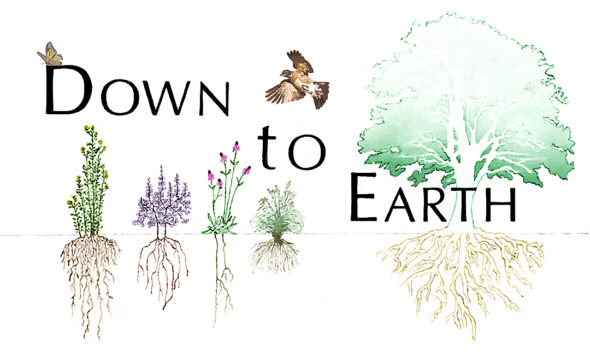
Down to Earth | Pandemic pastimes: Do they last?
- Published: April 3, 2023
By Cynthia Olsen
December 2022: “What on earth are you doing now?” my partner mused, already knowing the answer.
“What does it look like? I’m planning next year’s garden.” Silence, eye roll.
“Do you think you can move all of your seed boxes off of the dining room table before company comes over? We are having dinner tonight, you know”
I don’t blame her as I sit in a pile of brand new 2023 seed catalogs, which hold the promise of new varieties and trusted heirlooms, fruits and veggies with full-flavor, pest-resistant and consistent yields. The ad writers for these catalogs could be shilling for beauty products; the script would come out the same. “Fruits perfectly round, rosy, soft flesh with tight skin, blemish-free … makes you just want to take a bite …”
“It’s obscene,” I say.
Two years ago, some seeds were so difficult to come by due to the pandemic, I mailed a care package of seeds from my collection to my son in New York. I, too, couldn’t find some of my favorite varieties. I like to experiment and plant four or five varieties of the same thing, just for comparison. Spinaches and radishes were gone.
Prices have gone up, just like our food and other essentials.
As with the “Victory Gardens” of the past, during wartime, current surges in vegetable gardening are seen during recessions, such as in 2008–2009, and other times of national distress. As people nationwide stayed home, they took to their yards, window sills and balconies. Besides sourdough baking, fermenting and Zoom cocktail hours, we found ways to grow something in the pandemic. Containers, vertical gardens, raised beds and trellises were going up everywhere. Companies couldn’t keep up with the filling of seed packets for incoming orders. Seed sales rose 300% during the pandemic, and experts predict the trend will continue. Now is the time to get on the move to find your seeds for this year’s planting season. But there are other means of getting your seeds. Watch for local seed and plant swaps and sales.
Likewise, keeping backyard chickens has risen as a popular must-do on the pandemic list and appears to be thriving still. Out of the top 150 populated cities in the U.S., 93% allow backyard chickens, with different stipulations. Estimates by the USDA placed 13 million, or 3% of Americans, having backyard chickens in 2019. This number has risen sharply, and several hatcheries have reported chick sales rising 400–500% during the pandemic and not slowing down. Searches for “baby chick supplies” on Amazon were up a whooping 758%. (I apologize, but when I read this, I imagined baby chicks in diapers; my problem).
Like the “Pandemic Puppies” that were returned to stores and shelters once the grownups returned to work, not all hobbies worked out. The number of registered beekeepers in the surrounding area steadily increased during the pandemic but appears to have fallen. Whether these numbers are accurate is yet to be fully analyzed. Everyone wants to help bees and pollinators, and the pandemic seemed like a great time to join in. But many folks didn’t appreciate the costs, work and skills required to raise bees. Like puppies, they need parasite treatment three or four times a year, along with nutrition, plenty of running space, a warm home in winter and to be talked to nicely.
So, how to make these endeavors fun and enduring? Don’t waste your initial efforts by being discouraged. For gardeners, seed and stock demand remains high, but there are other means of getting new products. Watch for local seed and plant swaps and sales. Order early, and if your favorite is sold out, try something similar. You might find that you like it. Try a garden club or workshop.
There are national poultry groups that are helpful getting you started in your chicken raising. Losses in birds are real and responsible for the higher prices in both meat and eggs. Updates on the Highly Pathogenic Avian Influenza, or HPAI, can be found on the website of the Ohio Department of Agriculture, or ODA, at agri.ohio.gov. Due to recent outbreaks of HPAI, owners must report unusual signs of disease and unexpected fowl deaths to the ODA at 614-728-6220.
Honeybees — all bees — need our help. Don’t give up on your beekeeping equipment and start-ups due to a bad year. As with other domesticated animals, we can’t just throw our beehives in the backyard and leave them for the year. They need attention, management and monitoring. Based on the number of calls to the Yellow Springs Police Department for dogs left in local cars, people here seem to care about animals. Read about bees. But also call a local beekeeper for help, and join a bee club or upcoming class. Your apiary site must be legally registered with the ODA, at agri.ohio.gov, for the nominal price of $5.
*The author is a medical doctor and professor emerita of family medicine at Wright State University School of Medicine. Vegetable gardening and healthy home cooking in a sustainable fashion are passions of her spare time.
2 Responses to “Down to Earth | Pandemic pastimes: Do they last?”
The Yellow Springs News encourages respectful discussion of this article.
You must login to post a comment.
Don't have a login? Register for a free YSNews.com account.











Posting comments! and reading YSNews! That’s what I did during the pandemic and obviously it is addictive ’cause I’m still doing it! Thanks to the YS News staff for their tolerance and endurance reading my ruminations and fluctuating thoughts! Bless ya’all! Peace
Your kitchen table sounds like ours! George just moved all the potato sprouts to the garden beds, so we have room to entertain again – or I can get out another jigsaw puzzle…the only pandemic-hobby I picked up and continue. I was already baking sourdough, and the chickens have been here 8 years.